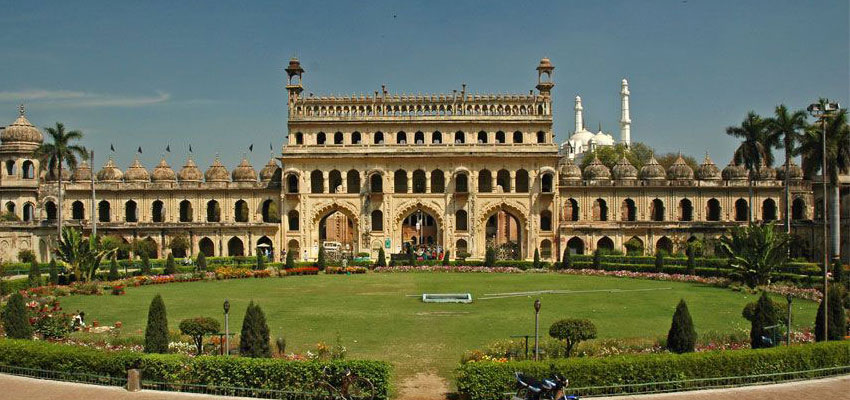By Mehru Jaffer
The announcement that the Gomti Express was four hours late that day was followed by a loud chorus, Oh no, not again!
Despite the disappointment that one would have to keep awake several hours after midnight to pickup the niece traveling down from Delhi in the same train, the drive down to the Railway Station at 4 am that evening eventually proved to be the most mesmerizing moment during my month long sojourn in Lucknow.
Cruising past Gomti Nagar by the marble white magic of the Taj Hotel and over the Gandhi Setu, which the younger members of the family have nicknamed the ‘Tit Bridge’, Lucknow looked breathtakingly beautiful. The reputation of Lucknow quite lost during the day as an Indian interpretation of mysterious lands far away, suddenly seemed to come alive at that special hour. The lights of the Ambedkar monument twinkled with such glee that it seemed as if the sky itself had stooped down with countless stars in its lap for a visit to the city.
The roads were mercifully empty of lorries that have taken to lording over roads here and the noisy crowds too were luckily swallowed up by the kind dark of the night. The VIP vehicles fitted with flash bulbs and sirens associated till recently with life only from the extraterrestrial were missed the least.
Often there was a whiff of unpleasantness from street corners that are blatantly used by the heartless as garbage dumps but even that unpleasantness continued to alternate with the intoxicating scent from flowers of numerous Champa trees and by the perfume from blossoms hidden in thick bushes of the Raat ki Raani and Kamini.
Devoid of the heat and dust of a busy day, the architecture of the Railway Station stood out in all its glory in that coolest hour of the clock. The drive back home proved what a wonder the Vidhan Sabha really is despite what goes on inside the building and also how precious the remaining although precariously dilapidated architecture from colonial times along Hazratgunj has become.
But much more than the crumbling buildings of yester years the slow decline in moral values in a city so famous even till recently for its live and let live attitude and gracious inter action not just with each other but also with strangers is moaned the most. Talking to the last breed of some senior citizens who have spent an entire lifetime practicing a certain way of life that can only enhance the existence of human beings, urgency was expressed on how to discourage unethical behaviour amongst the young. The problem is how to preserve all that is considered decent in life?
Not too long ago youngsters were taught never to attempt to resolve conflicts with weapons. I was told the story of Rafi Ahmad Kidwai who was the Home Minister when his brother was murdered in the bloody riots of 1947. When his supporters sought his permission to arm themselves to revenge the wrongdoers, the Congress leader and freedom fighter diffused the anger of the excited mob by pointing out that weapons had failed to protect the life of his brother and were good only to prolong a conflict.
The name of Lucknow University professors like NK Siddhant, DN Majumdar and DP Mukerjee are evoked for they had inspired a large number of students to follow the socialist ideal of love of ones self but never at the cost of consideration for the other. Professor Siddhant is remembered for having played host to the revolutionary leader Subhas Chander Bose whose presence on the university campus seldom failed to infuse the young to take care of all those in society who are less fortunate than themselves.
Feroz Gandhi who was perhaps one of the most colourful citizens of Lucknow in the mid 1940s was said to be crazy about the latest gadgets of the day. Gandhi kept an open house at La Place and happily demonstrated to all those who visited him how to use a toaster or a radio and flaunted his vast collection of watches. But he is also remembered for being extremely generous at heart and often gave away much of what he owned to those with a greater need than his own.
KD Malviya another giant of a Congressman welcomed people of all faiths and ethnic variety to his dinning table for he did not believe in the politics of, us versus them. His wife came from a rural background and was quite illiterate but she was always found by his side and treated like an equal by the graduate of the Harcourt Butler Institute of Technology.
The political culture of that time was different to today when members of the Congress party were looked upon merely as human beings and not divided up into a herd of class, caste or creed. The Congress was not just a political party but an extended family where those who had, were not shy of sharing it all with those who did not, from wisdom to wealth. An example is the deep affection that Ashok Chaubey continues to hold for my 86 year old father. Chaubey is the young son of Congressman Vishwanath who was part of that historic group of heroes who had dared to defy the mighty British and declared Balia independent from the colonialists during Mahatma Gandhi’s Quit India movement.
The courage of Congressman continued to surface occasionally even in recent times when Kamlapati Tripathi not too long ago had publicly said that the axe will have to first fall on his neck before it fell on the Babri Masjid.
As I admire the view from the Tit Bridge of the sprawling Ambedkar park and the imposing monument that makes Lucknow resemble although for a moment some of the most glittering capitals around the world I wonder how many of his values are also being practiced, especially by all those who claim to hold the memory of the great freedom fighter closest to their heart?





